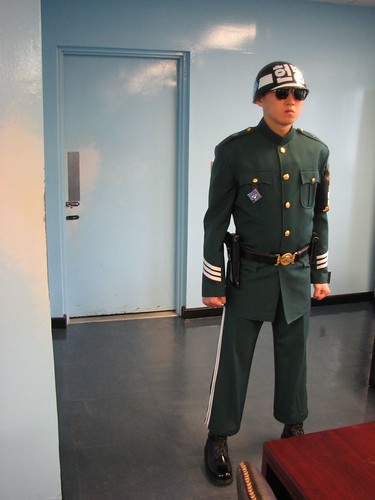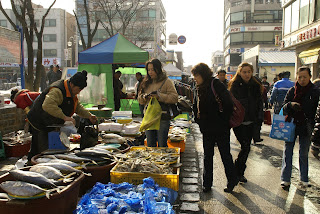In the morning we woke up later than planned. It was so quiet in the apartment of our host. Such quiet I have not experienced on the long run up till now. What was scary in the evening when we got here suddenly appeared to be so bright and full of sun.
That settlement had been 30 years old up till now as our host explained. Indeed he had what people in Korea hardly have any longer. Keys to his apartment. A set of small metal thingies which give a feeling of a real home.
This morning it was even colder. -23 according to weather forecast. We were laughing our cold off all the time. After all two women on the go is always lots of fun, once they start joking it never ends.
The plan for today was seeing islands on the lakes. Several of them had been also pictured in Winter Sonata. It had been a one chance in a million to see what Korean people consider romantic.
We headed towards Jungdo Island on the lake near city center. This time we had been from Europe and from India for the purpose of taxi driver curiosity. Freezing cold got even inside the cab. 15 minutes after leaving the apartment we could not feel our feet any longer. Ajoshi wasn't much talkative either. He had been watching tv on his car and probably cursed the fate of his job. Blue morning sky was totally clear, whiteness of the snow unreal for the city's vincinity, looked like taken straight from Queen of Snow fary tale. Would anyone through a piece of ice into my eye this day? Or would I meet someone who would melt it away?
On a ferry to Jungdo Island it seemed that only foreigners can be crazy enough to do any outdoor sightseeing in this weather. Just us and the captain of the floating device. A thought crossed my head, what if something happens to this boat in freezing cold like this. Sun reflected on the icy water. By this time Yukti was hungry but we were still stubbornly on the go. Weird are these foreigners.
- Call us 5' before you want to go back. - worried captain told us.
Apparently he was not sure if we get lost on the island or not. It was the nicest ever approach in my life, private ferry services for not that expensive price of 5000KRW. We got off at the bank and we saw the island. Not a desert island though, a bunch of Koreans headed desparately to the ferry from the freezing cold outside. And us...headed exactly there.
We saw a plastic orange tent serving as a waiting room for a ferry. Somebody resourceful had also made a live fire in the metal barrel exactly like for homeless people somewhere around dark corners of NY or any other city. . In such circumstances the very fact that there is a roof waiting somewhere makes one happy. Very happy. Even if the aircon is noisy washrooms are not private and the nightwatch sees all of your actions.
After 200m of a walk Yukti asked:
- Can you stand this?
- No I can't Yukti, it's over. Let's get somewhere under the roof and try to figure out what's here.
- Ok.
- Can you stand this?
- No I can't Yukti, it's over. Let's get somewhere under the roof and try to figure out what's here.
- Ok.
We got inside the local equivalent of something between a kiosk a convenience store and a restaurant. In the middle of it coal heater was settled under traditional huge pot boiling water for whatever reason. Ajoshi behind the counter merely glanced at us and got back to reading Chosun Ilpo. Frozen, we slowly let ourselves relax near the warmth. Feeling of desparation appeared on Yukti's face when we bought onion chips just not to annoy the owner of our shelter too much.
- All this way from Suwon and we bought chips. We sit and we eat chips. This is something we can do at home.
Burst of sarcastic laugh on my side had put a period to this statement. No matter how motivated I am, -23 degrees is not a temperature for me to handle. My camera would also give up soon.
We headed for a walk towards the pension where they pictured Winter Sonata. It crossed my mind that I understand what is it what Korean public considers romantic. The camp site combined of some 30 small wooden cabins which can fit a family was situated at the lakeside. Away from the city noise, away from civilization. Remote, and underdeveloped for a Korean standard at least. In a country of constant homogenous constructions and no diversity such places can indeed be called romantic. They touch this gentle part of soul in a person.
- Can you imagine walking hand in hand with a beloved one on crunching snow like this in freezing cold? - asked Yukti.
- Yes Yukti, oh yes, I can.
Same thought apparently crossed our heads in the very same moment. Indeed, this would be nice.
Sarcastic humour left us soon as we headed to a homeless barrel. It had been surrounded by a lot of ajummas and girls on sightseeing. Finally we were not only two desperados. They shared with us whatever they had, it touched my heart not for the first time how they share whatever limited resources they have. These were some sticky cookies and pieces of baguette. Filled our stomaches for the time being. Because you are a guest and because you are welcome. Such is Korean heart. Such is the part of it which I genuinely love.
Back in downtown we asked for anything to eat and proud locals had recommended us Dalgalbi of course.
- Apero hagu uenchok and you are there. Straight and on the left.
I looked ahead and thought that no, Dalgalbi can wait until I visit Chuncheon anytime in my life again. Maybe that time it will be different? Somehow, I don't remember when, we ended up at E-Mart because it was warm. Finally warm.
Such was the trip to a city of Chuncheon. It left me with the impression that what humans perceive as romantic is what touches the primeaval part of human consciousness which is connected to nature. It brings me up the words of Gary Snyder, converted buddhist and poet: ''Culture which cuts off from natural and wild life around us and which denies the wild life inside us drives to very dangerous phenomena which will probably destroy humanity one day”.
Chuncheon 16th January 2011



































